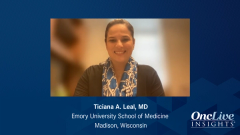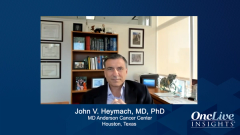
IO Therapy in NSCLC With Concomitant KRAS/TP53 Mutations
Closing out her discussion on the management of actionable mutations in NSCLC, Meghan Mooradian, MD, highlights the detection and implications of KRAS/TP53 mutations.
Episodes in this series

Transcript:
Meghan J. Mooradian, MD: TP53 is a very common mutation that we’re often finding in our next-generation sequencing. These mutations can be found in isolation, and they can often co-occur with mutations such as KRAS. These mutations do not often sway clinicians one way or another to use immunotherapy [IO] or immunotherapy plus chemotherapy combinations. What we have seen is that the combination of KRAS and TP53, at least in retrospective cohorts, does seem to enrich for patients who are more likely to respond to immunotherapy. In a retrospective publication that was looking at KRAS in co-occurring alterations, one of the specific alterations that was looked at was the KRAS/TP53 combination. In this subgroup, we actually saw superior outcomes in comparison to KRAS-mutated non–small cell lung cancer without a concomitant TP53 mutation, an improvement in response rates closer to 40% vs the 20%.
A TP53 mutation is often discovered on our next-generation sequencing panel. Typically, the presence or absence of a TP53 mutation does not change the clinical decision-making in respect to first-line therapies that are employed, whether that be combination chemotherapy plus IO, IO, or in the setting of an EGFR mutation. At this point, though it’s important again to gather all of the genomic information, certain mutations such as TP53 will not necessarily impact clinical care.
When KRAS and concomitant TP53 mutations are detected, patients are often treated with frontline immunotherapy plus or minus chemotherapy, depending on clinical factors and the PD-L1 TPS [tumor proportion score]. I’m not aware of any clinical trials that are stratifying patients based on the presence of KRAS and TP53, and not aware of any clinical trials that are specifically looking at this co-occurring mutation.
Transcript edited for clarity.







































